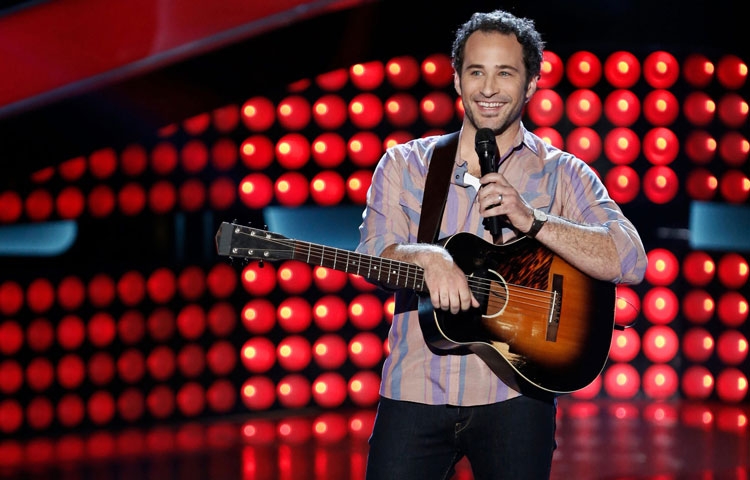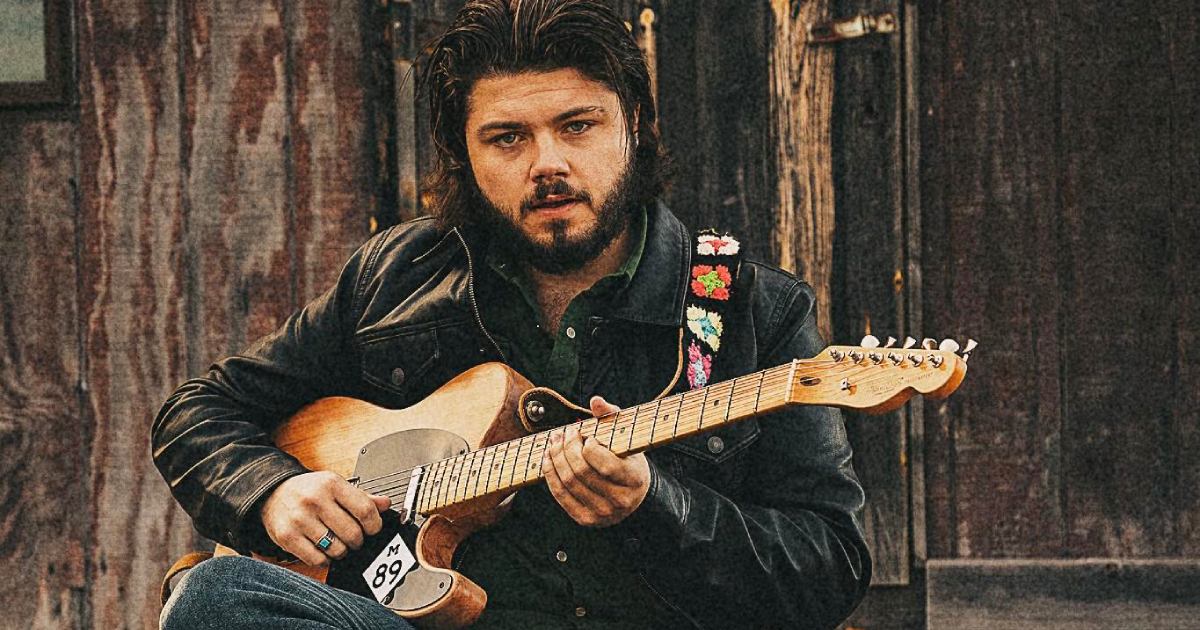When singer-songwriter Joshua Davis appeared on the season-eight premiere of “The Voice” in February, the viewing audience that one evening was a staggering 13.97 million viewers — a far cry from his previous string of intimate gigs.
“Last time I went to East Lansing I played (SCENE) Metrospace — there were maybe thirty people there,” recalled Davis about a late 2014 show at a tiny art gallery. That was pre-“Voice.” “Now I’m playing Wharton Center and over half of the tickets sold already,” he said. “It’s huge. I don’t know what to expect anymore. Since the show, everything is different now.”
It’s no surprise being on NBC’s hit reality television singing competition would be a game-changer — finishing in the final four didn’t hurt. Over the course of the season, which wrapped in May, Davis transitioned from Michigan’s folk gem to a household name.
But you can’t say he hasn’t paid his dues. As the frontman of the esteemed roots-rock band Steppin’ In It, Davis, 37, has been embedded in the Michigan folk-music scene for over 15 years. His acclaimed solo records on the Earthwork Music imprint, including 2013’s A Miracle of Birds LP, further solidified his place in the thriving Michigan Americana underground.
This year Steppin’ In It has been on somewhat of a hiatus: Davis relocated his family from Lansing to Traverse City and upright bassist Dominic John Davis split to Nashville, joined Jack White’s band and proceeded to tour the world. During this transitional period is when Joshua Davis got the call from “The Voice.”
Still riding the wave of press and buzz from the show, Davis decided to stick close to home for the summer, playing a string of Michigan dates including July 8 at Bell’s Brewery in Kalamazoo and July 10 at Fountain Street Church in Grand Rapids.
He chatted with Revue from his home in Traverse City. Here’s what he had to say about his past and future.
Going way back, where were you born and raised?
I was born in Marquette, raised in Detroit. Then I went to Michigan State for theatre. I lived in East Lansing for 15 years.
You prefer to dig back and find great, old American tunes. How did you first get into roots music?
I grew up going to folk festivals. My parents took me to Hart Plaza in Detroit where there’d be a blues fest, world music fest, bluegrass festival or a gospel festival. We went out and saw a lot of live music when I was growing up. One of the things about those kind of festivals is the artists are very accessible. That’s the core difference between mainstream music and roots music. One of the main points of music is you have to pass the torch otherwise it’s going to die out. I got to meet a lot of my heroes like Dave Van Ronk and Joel Mabus and learn from them. They’d take time to talk to a young kid about guitar — about what they do and how they do it. That’s something that’s important to me: Passing the torch and keeping the music alive.
How did you manage to land a spot on “The Voice”?
I’d never seen the show before. They called me late in the game. I was one of the last additions to the auditions. They’d seen some videos of mine. They called me up and said, “How about you come out to Los Angeles in two weeks and do a blind audition.” I was like, “What’s that?” They said, “Watch the show a little bit and call us back.” So I checked out the show.
I take it you’re not into reality shows like “American Idol”?
It’s not really my bag, especially the reality show thing. It really kind of leaves a bad taste in my mouth. But this show specifically, I watched it with my nine-year-old daughter and I felt comfortable with her watching it. It’s very positive. Unlike a lot of the other shows, nobody is trying to embarrass anybody. Nobody is trying to rip anybody else down. It’s positive and inspirational. It’s really well done.
Being on a reality TV set is something new for you. What was a typical day like?
Early on there’s a lot of hurry up and wait because there are so many contestants at that point, 108 people or so doing the blind auditions. You go get wardrobe on, go rehearse with the band, get makeup on, do interviews, go shoot b-roll somewhere. You move to a location and then sit there and wait for four hours. You have like five minutes of activity and then go to a different location. When it went live, there was less people and a lot more to do. It was a lot more constant activity. By the time it got further, down to the final 10, eight, six — it was 18-hour days. I’d learn three or four songs in a week — rehearse them and then play them on live television. It was madness by the end of it. It was definitely totally exhausting. In a lot of ways it’s kind of a stamina game — who can outlast everyone else without getting sick or losing it.
How do you pick the songs you perform on “The Voice”?
All the contestants have a list of the songs we want to do. My list consisted of all sorts of obscure stuff that they’d never, ever in a million years let me do. Which is fine, it’s a television show — it’s entertainment. In my case usually they’d say, “There’s absolutely no way we can do any of these songs.” But we’d compromise on some things.
You performed your original song “The Workingman’s Hymn” on “The Voice.” How did you make that happen?
The most important thing to me was playing the song I wrote on the show. I can’t tell you how hard I had to fight to get my song on that show. It was an incredible battle. I really put my foot down and was kind of a jerk about it. I finally got my way. It turned out to be one of my bestsellers on iTunes — I had a few songs in the Top 10 of iTunes. So I’m hoping that tells the show they can do some actual original songs, songs people can’t sing along to right away, and have a little more faith in the American public.
Have you noticed the boost in your fan base? How so?
I’d be walking through LAX to fly out and everybody there would recognize me. Another is social media. Before “The Voice” began I think I had something like 800 Twitter followers, now I have around 31,000. Likewise with Facebook. I had maybe 5,000, now I have 60,000 likes. That’s a monstrous bump. I think the goal is to use that momentum. It’s strange. Because “The Voice” is what it is, I had to fight every day to maintain who I am in that environment. You have a minute and half or two minutes out there to show millions of people what you can do but it doesn’t show the entire you. So there are a lot of people who just know me from “The Voice” now. That’s going to be an interesting thing to navigate — to see what they think of Joshua Davis not on “The Voice.”
Do you plan to put out a new record soon?
Yeah, that’s one of the things I’m going to be doing. Maybe at the end of the summer or very early fall I’m going to be in the studio recording at least a few tracks — maybe for a 7-inch single — and then work toward a record. I want it to be really good. With all of my albums I put a lot of intention into it, make sure there’s a storyline and consistent thread to the songs. I’m a perfectionist so I want to take my time with it, as well. I don’t want to just throw something out there.
When did Steppin’ In It get together?
Steppin’ In It formed in the spring of ’98. They were already playing together a little bit as a trio when I met them. I called Dominic (John Davis) up and he said, “Come on over, we’re auditioning people,” so I went over there. Honestly, playing with them for the first time — the feeling was so incredible. It’s one of those moments you never forget. We knew a lot of the same music — it’s almost like we were reading each other’s minds.
What’s the difference between a Steppin’ In It album and your solo LPs?
When I was writing for Steppin’ In It, it was a lot more genre-based. My bandmates, the Wilson brothers, play so many different instruments and we all love traditional American music so I’d find myself writing genre-specific songs. It’d be like, “Okay, this is going to be a Cajun song,” so the Wilson brothers would pick up an accordion and fiddle. Other genres would call for other instruments. It’s amazing the band can do that. There are very few bands that can pull that off. But when I’m writing for me, I’m focusing on the songs and telling a story.





